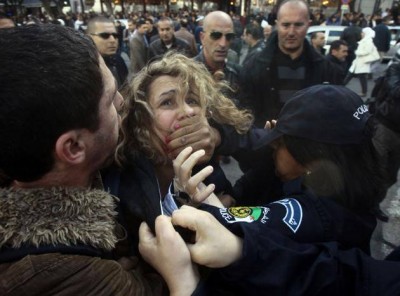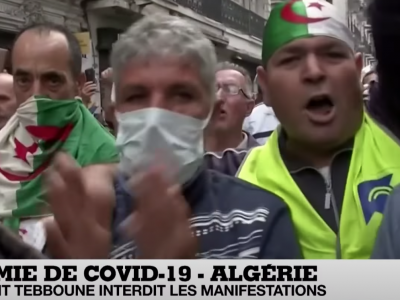One month ahead of Algeria's presidential election scheduled for April 17 [fr], it appears freedom and civil liberties in there are under threat.
Independent television network Al-Atlas TV [ar], known for broadcasting Algerian opposition viewpoints without any restriction or censorship, was shut down by Algerian authorities [en] on March 11.
In the currently tense atmosphere leading up to the vote, the loss of Al-Atlas TV comes as Algerian protesters faced violent pushback from police. Six candidates are in the running, among them Abdelaziz Bouteflika, the outgoing president who is seeking a fourth term after having ruled the country for 15 years.
Al-Atlas TV stopped broadcasting following pressure from the Bouteflika regime on the Jordanian satellite provider Noorsat that carries the channel. One day earlier on March 10, Al-Atlas studios and offices were raided [en] and all their materials including cameras, computers, DVDs and recording tapes were seized under the pretense that the channel doesn't have an official license to broadcast in Algeria.
Al-Atlas TV has aired programs since 2012, and its news crew consists of young and freshly graduated Algerian journalists and technicians. According to Amnesty International and Al-Atlas TV lawyers, foul play was at hand here:
Reportedly issued a temporary licence in 2013 and, upon applying for an extension for 2014, was informed that such a renewal was not necessary given that a new audiovisual media law to regulate private television channels would soon come into force. The law was passed by Algeria’s parliament and senate in January but has yet to be promulgated.
On the network's YouTube channel, Al-Atlas TV Information Director Ghoul Hafnaoui pleaded for the support and solidarity of Algerian and foreign journalists:
Never before have the channel executives or staff been harassed. Al-Atlas TV holds the same legal status as the other private television stations in Algeria, which were are all still allowed to broadcast. So why the ban?
Hichem Bouallouche, the network's general director, told Algerian media that the authorities want to punish Al-Atlas because it opposes the fourth mandate sought by President Bouteflika.
In spite of a strong show of solidarity from TV colleagues and reporters, Algerian authorities have maintained their position on the ban. The chorus of condemnation from organizations such as Reporters without Borders and the Algerian League for the Defense of Human Rights as well as the strong mobilization of Algerian journalists and cyber activists have failed to dissuade the regime from putting an end to this blatant violation of freedom of press.
Another repressive act by the regime ahead of elections is the crackdown on peaceful protest in the streets. Freedom to demonstrate is consecrated in the Algerian Constitution. Yet that right is jeopardized by those entrusted with guaranteeing it. Barakat (meaning it's enough) opposition movement members attempted twice to hold sit-ins at the University of Algiers to denounce a fourth term. And both times they saw their protest broken up and members arrested.
The screen capture below went viral on social media in Algeria. It shows a supporter of the Barakat movement attacked by police officer forbidding her from chanting against the president's run. Captured by an Algerian photojournalist, it has been reposted by Envoyés Spéciaux Algériens (Special Algerian Envoys), among others:

Civilian Protests on March 6 – screen capture of video by Algerie choc on YouTube
The videos and photos of the violent police repression toured the global web. Algerian Police Chief General Abdelghani Hamel has tried to justify his officers’ violent behaviour and these more than 260 arrests by saying that high officials in the regime were behind the crackdown.
The following footage aired by Al-Atlas TV on March 6, a few days before the interruption of its broadcast, show how police treated protesters abominably in Algiers:
Al-Atlas TV is probably the only private channel in Algeria standing against Bouteflika's fourth term. The picture in the country is quite gloomy nowadays. But civil society refuses to sit back and give up. The Barakat Movement is calling for protests throughout the country. The battle continues.



